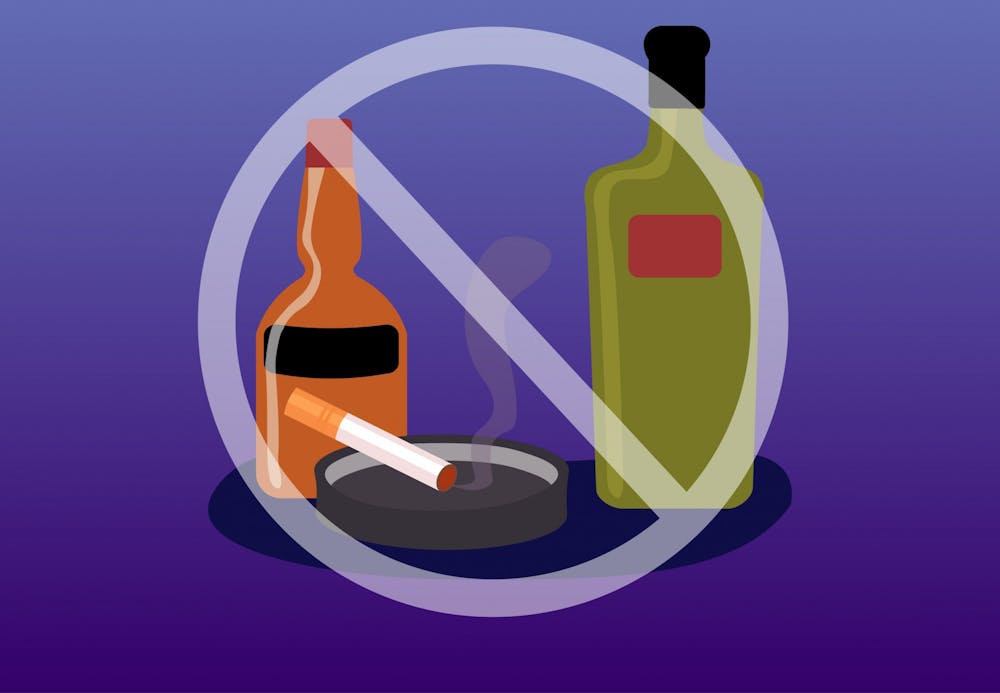The words from Asher Roth's 2009 university anthem "I Love College" still ring true for many: "Man I love college (hey), and I love drinking (hey)."
But that lifestyle of "getting wasted," Roth repeats numerous times, never interested me.
Young adults, especially college students, may often feel like drinking, smoking or doing drugs is a requirement to fit in with their friends or at parties. But there are other lifestyles students can choose to live.
The straight edge lifestyle is a commitment to abstinence from alcohol, recreational or illicit drugs and tobacco, or the abuse of such substances.
Straight edge is a movement that began in the punk rock scene of the early ‘80s when “sex, drugs and rock and roll” was a common theme in music. In 1981, punk band Minor Threat released a song called “Straight Edge” that began a new, impactful movement.
The song’s lyrics praised the idea of rejecting things like drugs and alcohol: “I’m a person just like you, but I’ve got better things to do than sit around and smoke dope, ’cause I know that I can cope ... Always gonna keep in touch, never gonna use a crutch. I’ve got the straight edge.”
Following the release of the song, the newly named straight edge movement gained popularity among other punk and hardcore bands of the early ‘80s who wished to change the way people viewed the rock and roll lifestyle by abstaining from alcohol, drugs and tobacco.
Minor Threat's frontman Ian MacKaye shared his ideology that the punk movement was supposed to be rebellious against social injustices, but there was a better way to rebel than to engage in self-destructive behaviors such as substance abuse.
The straight edge movement, or "sXe," quickly gained traction, with those who abstain from drugs and alcohol using the letter "X" to identify themselves.
Since I was about 14 years old, I knew I did not have any interest in drinking or doing recreational drugs. I felt slightly embarrassed about this because I associated drinking alcohol with being an adult, and I wondered if I just wasn't mature if I found no appeal.
There were a number of factors that made me uninterested in such things. But to put it simply, I saw what substance abuse did to others, and I knew that I did not want that life for myself.
I knew high schoolers who were struggling with addictions they had to hide from their parents. I went to places, such as concerts, and often saw people having to be wheeled out on stretchers because they were so drunk that they passed out before the main act even came onstage. Neither instance seemed like any fun to me.
I first heard the term “straight edge” in a YouTube video when I was 15 years old. YouTuber Patty Walters described feeling distant from his friends when they started experimenting with drugs and alcohol, feeling uncomfortable with peer pressure from these friends and even wondering if something was wrong with him for not being interested.
It was the first time I heard someone share my feelings, and it was incredibly refreshing. Having a term to describe myself made me feel less alone and helped me realize there was nothing wrong with me.
The older I’ve gotten, the use of drugs and alcohol by those closest to me has become more prevalent. As my friends turn 21, I watch them as they get prescribed medical marijuana cards and buy alcohol.
Some people hold on to the stereotype that I should automatically dislike anyone who chooses to drink, smoke or use drugs, but that is simply not true. Just like I don't want to be peer pressured into doing drugs or drinking alcohol, it is not my place to peer pressure my friends into stopping if they are using these substances responsibly.
I used to be scared that I would lose friends because no one would want to hang out with someone who is sober. In college, I have found this is not the case and abstaining from drugs and alcohol is more common than I used to think. There are a multitude of reasons why someone might choose not to drink or smoke, all of which are completely valid.
If you are struggling with addiction, there are resources provided by the University through Live Well @ ASU and Recovering Rising. Additionally, the Substance Abuse and Mental Health Services Administration provides treatment referral and information to anyone in the U.S. if you call 1-800-662-4357.
Reach the reporter at erfontan@asu.edu or follow @EndiaRain on Twitter.
Like The State Press on Facebook and follow @statepress on Twitter.




